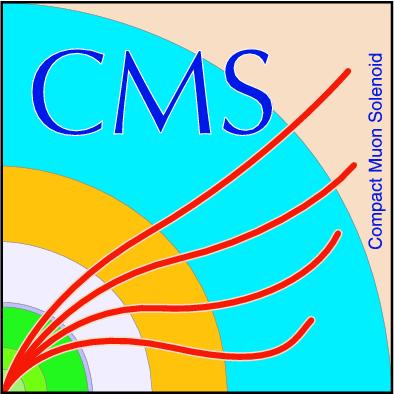
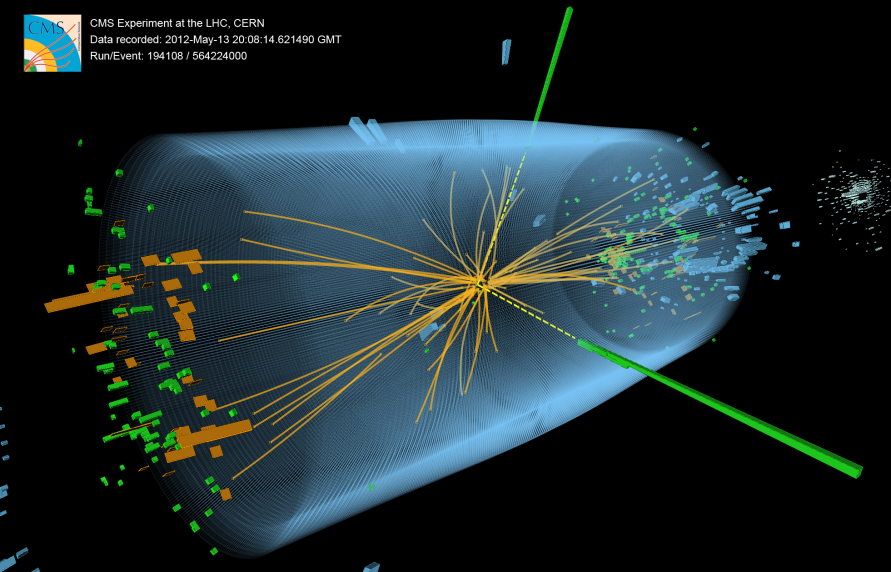
Compact Muon Solenoid
LHC, CERN
| CMS-PAS-HIG-18-014 | ||
| Search for charged Higgs bosons with the $ \mathrm{H}^{\pm} \to \tau^{\pm}\nu_\tau$ decay channel in proton-proton collisions at $\sqrt{s}= $ 13 TeV | ||
| CMS Collaboration | ||
| September 2018 | ||
| Abstract: A search for charged Higgs bosons is presented in the $ \mathrm{H}^{\pm} \to \tau^{\pm}\nu_\tau$ decay mode in hadronic and leptonic final states. The search is based on 35.9 fb$^{-1}$ of pp collision data recorded by the CMS experiment in 2016 at a center-of-mass energy of 13 TeV. The results agree with the expectation from the standard model. Upper limits at the 95% confidence level are set on the production cross section times branching fraction to $\tau^{\pm}\nu_\tau$ for a charged Higgs boson in the mass range from 80 to 3000 GeV, including the mass region near the top quark mass. The observed limit ranges from 6.0 pb at 80 GeV to 0.005 pb at 3 TeV. The limit is interpreted in the context of the MSSM $m_\mathrm{h}^\mathrm{mod+}$ scenario. | ||
|
Links:
CDS record (PDF) ;
CADI line (restricted) ;
These preliminary results are superseded in this paper, JHEP 07 (2019) 142. The superseded preliminary plots can be found here. |
||
| Figures & Tables | Summary | Additional Figures | References | CMS Publications |
|---|
| Figures | |

png pdf |
Figure 1:
Leading-order diagrams describing charged Higgs boson production. Double-resonant top quark production (left) is the dominant process for light ${\mathrm {H}^{\pm}}$, while the single-resonant top quark production (middle) dominates for heavy ${\mathrm {H}^{\pm}}$ masses. For the intermediate region (${{m_{{\mathrm {H}} ^\pm}} \sim {m_{{\mathrm {t}}}}}$), both production modes and their interplay with the nonresonant top quark production (right) must be taken into account. Charge-conjugated processes are implied. |
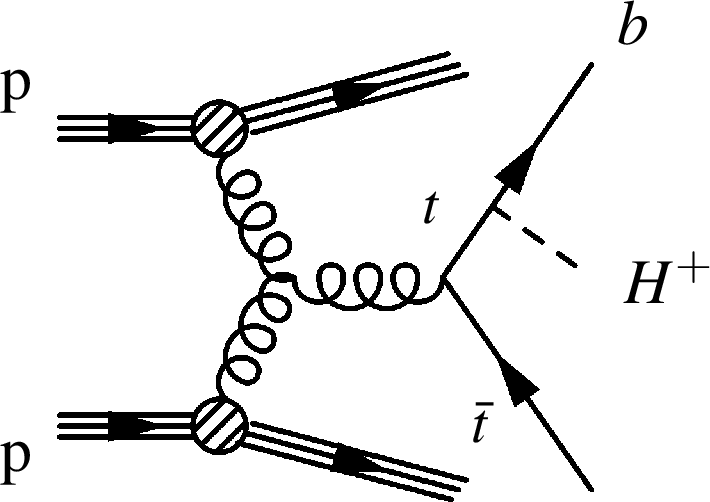
png pdf |
Figure 1-a:
Leading-order diagram describing charged Higgs boson production. Double-resonant top quark production is the dominant process for light ${\mathrm {H}^{\pm}}$. Charge-conjugated processes are implied. |
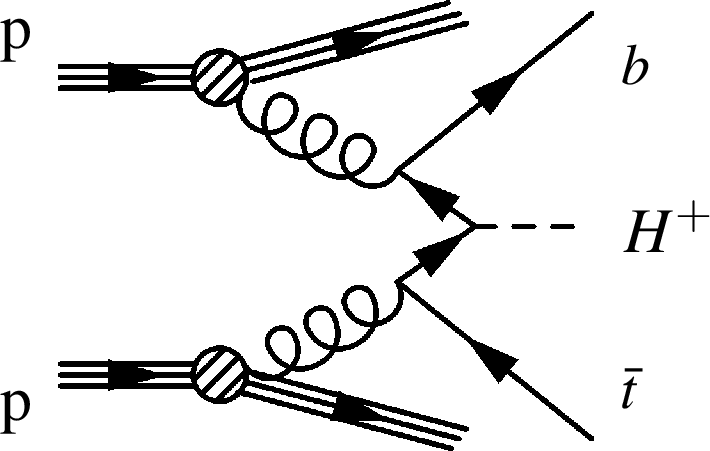
png pdf |
Figure 1-b:
Leading-order diagram describing charged Higgs boson production. Single-resonant top quark production dominates for heavy ${\mathrm {H}^{\pm}}$ masses. Charge-conjugated processes are implied. |
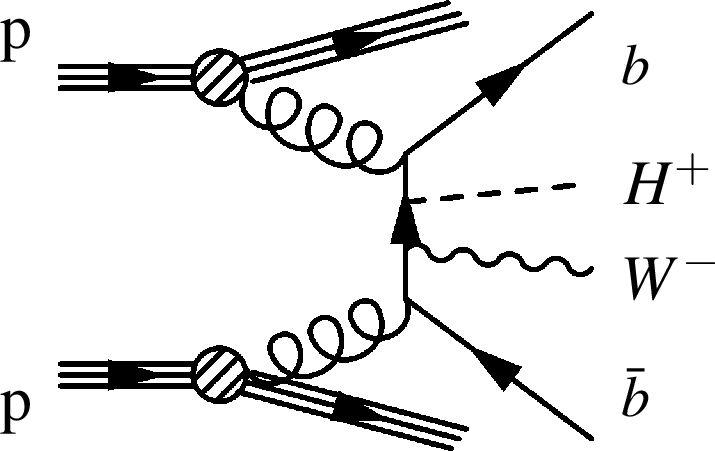
png pdf |
Figure 1-c:
Leading-order diagram describing charged Higgs boson production. For the intermediate region (${{m_{{\mathrm {H}} ^\pm}} \sim {m_{{\mathrm {t}}}}}$), the nonresonant top quark production must be taken into account. Charge-conjugated processes are implied. |
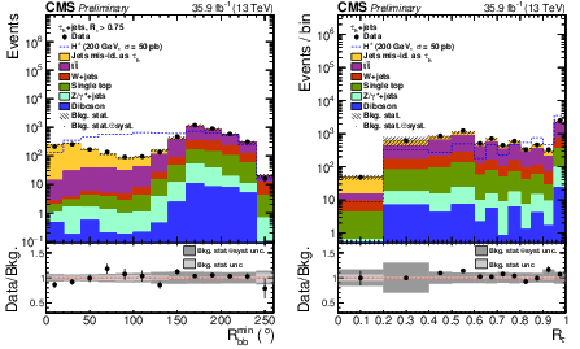
png pdf |
Figure 2:
The distribution of the angular discriminant $ {R_{\text {bb}}^\text {min}} $ after all other selections, including $R_ {\tau} > $ 0.75 requirement, have been applied (left) and the distribution of the $ {R_ {\tau}} $ variable used for categorization after all other selections, including $ {R_{\text {bb}}^\text {min}} > 40^{\circ}$ requirement, have been applied (right). |
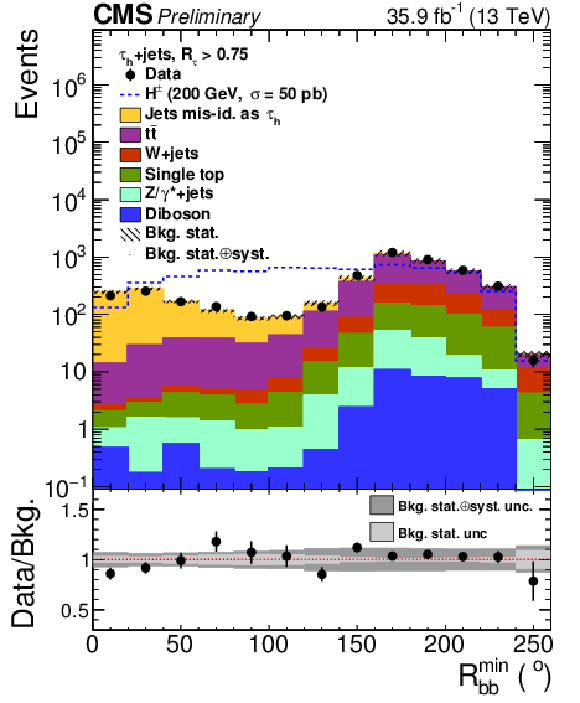
png pdf |
Figure 2-a:
The distribution of the angular discriminant $ {R_{\text {bb}}^\text {min}} $ after all other selections, including $R_ {\tau} > $ 0.75 requirement, have been applied. |
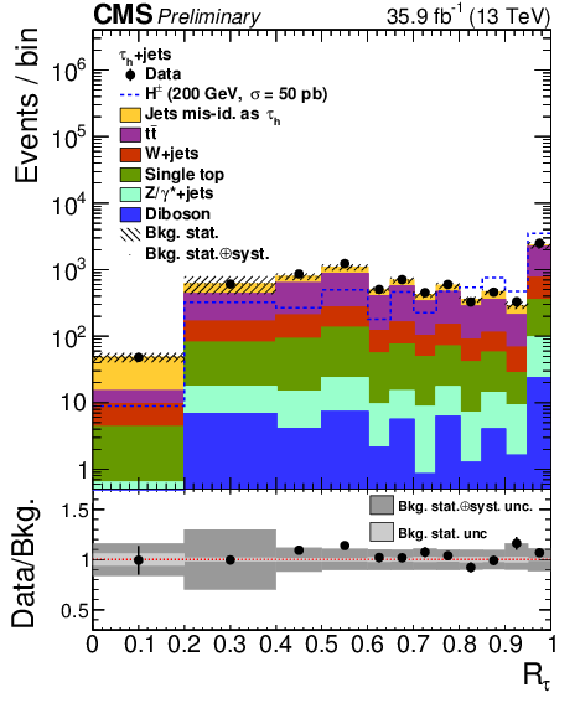
png pdf |
Figure 2-b:
The distribution of the $ {R_ {\tau}} $ variable used for categorization after all other selections, including $ {R_{\text {bb}}^\text {min}} > 40^{\circ}$ requirement, have been applied. |
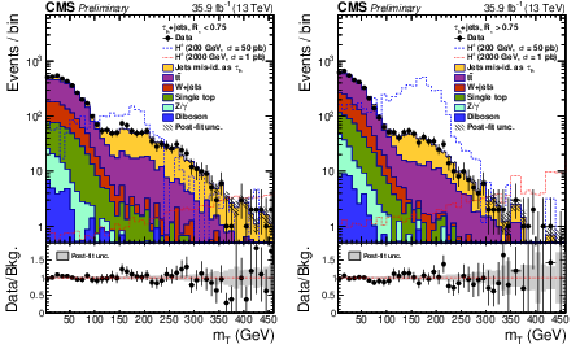
png pdf |
Figure 3:
The transverse mass distributions in the fully hadronic final state after a background-only fit to the data, for the categories defined by $R_ {\tau} < $ 0.75 (left) and $R_ {\tau} > $ 0.75 (right). |
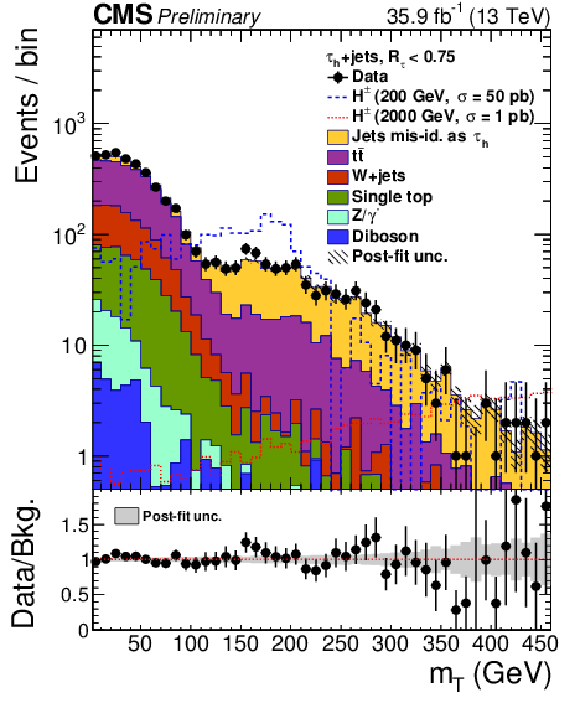
png pdf |
Figure 3-a:
The transverse mass distribution in the fully hadronic final state after a background-only fit to the data, for the category defined by $R_ {\tau} < $ 0.75. |
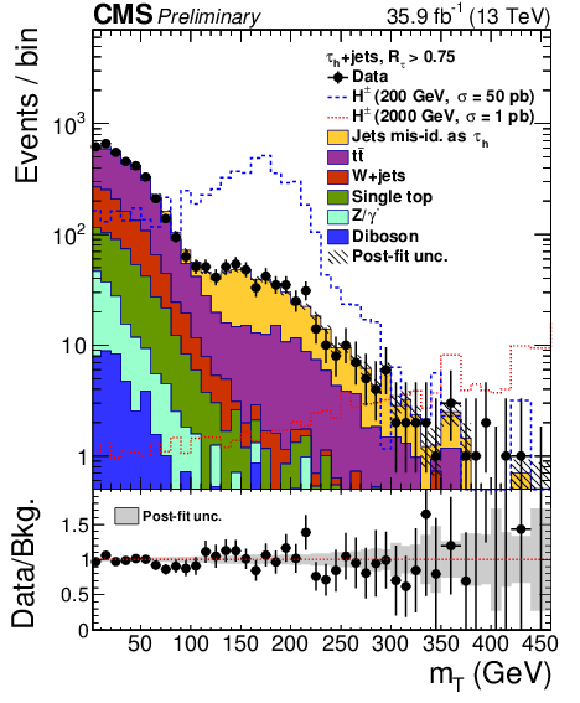
png pdf |
Figure 3-b:
The transverse mass distribution in the fully hadronic final state after a background-only fit to the data, for the category defined by $R_ {\tau} > $ 0.75. |
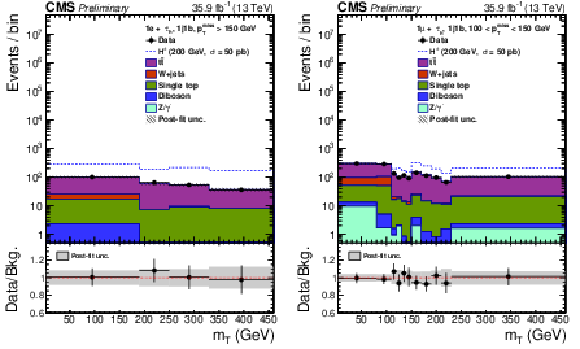
png pdf |
Figure 4:
The transverse mass distributions for two ${\ell} $+$ {{{\tau} _\mathrm {h}}}$ categories with high signal sensitivity after a background-only fit to the data. Left: category with one electron, one ${{\tau} _\mathrm {h}}$, one jet identified as a b jet and $ {{p_{\mathrm {T}}} ^\text {miss}} > $ 150 GeV. Right: category with one muon, one ${{\tau} _\mathrm {h}}$, one jet identified as a b jet and 100 $ < {{p_{\mathrm {T}}} ^\text {miss}} < $ 150 GeV. |
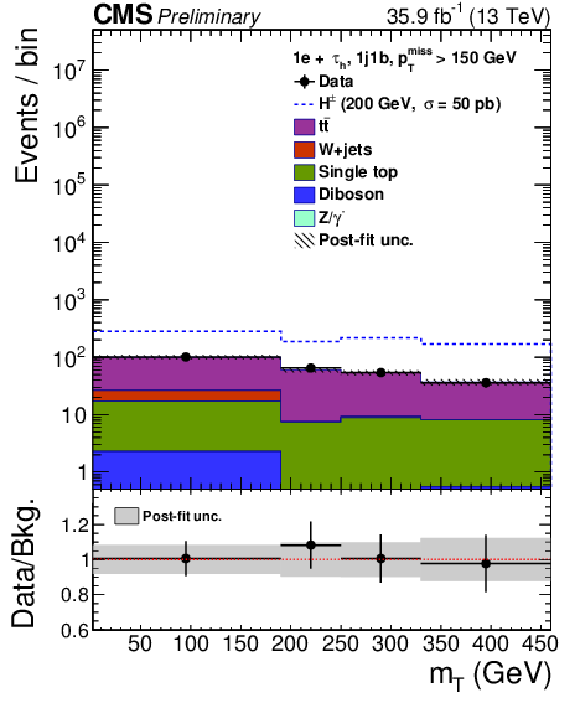
png pdf |
Figure 4-a:
The transverse mass distribution for the ${\ell} $+$ {{{\tau} _\mathrm {h}}}$ category with one electron, one ${{\tau} _\mathrm {h}}$, one jet identified as a b jet and $ {{p_{\mathrm {T}}} ^\text {miss}} > $ 150 GeV. |
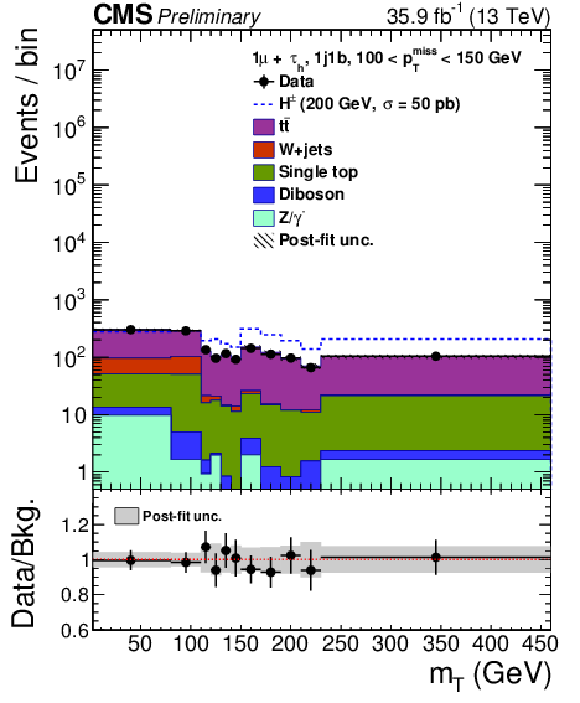
png pdf |
Figure 4-b:
The transverse mass distribution for the ${\ell} $+$ {{{\tau} _\mathrm {h}}}$ category with one muon, one ${{\tau} _\mathrm {h}}$, one jet identified as a b jet and 100 $ < {{p_{\mathrm {T}}} ^\text {miss}} < $ 150 GeV. |
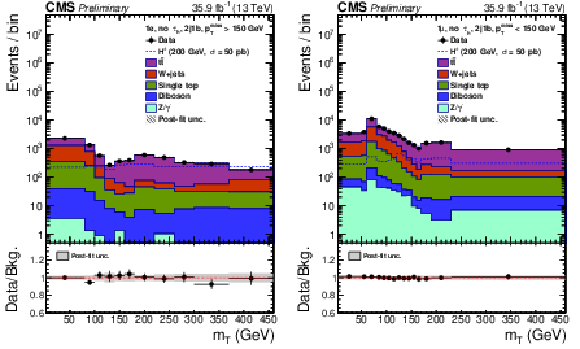
png pdf |
Figure 5:
The transverse mass distributions for ${\ell} $+no-${{{\tau} _\mathrm {h}}}$ categories with high signal sensitivity after a background-only fit to the data. Left: category with one electron, no identified ${{\tau} _\mathrm {h}}$, two jets (one of them identified as a b jet) and $ {{p_{\mathrm {T}}} ^\text {miss}} > $ 150 GeV. Right: category with one muon, no identified ${{\tau} _\mathrm {h}}$, two jets (one of them identified as a b jet) and $ {{p_{\mathrm {T}}} ^\text {miss}} < $ 150 GeV. |
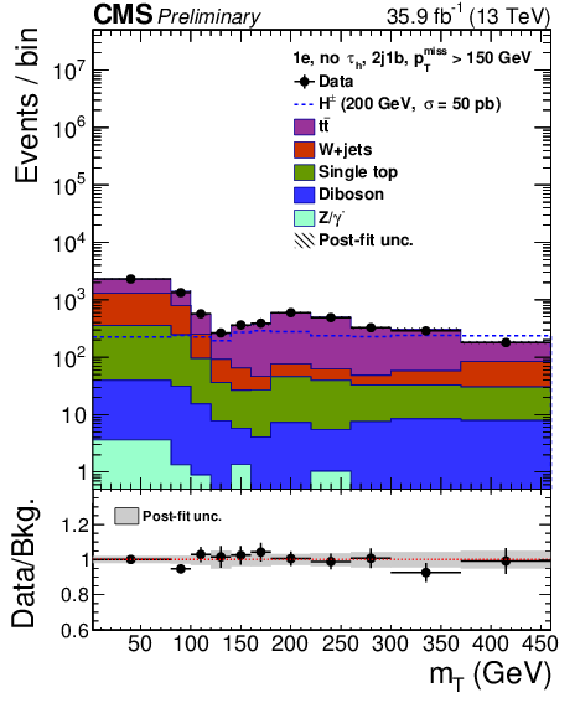
png pdf |
Figure 5-a:
The transverse mass distribution for ${\ell} $+no-${{{\tau} _\mathrm {h}}}$ category with one electron, no identified ${{\tau} _\mathrm {h}}$, two jets (one of them identified as a b jet) and $ {{p_{\mathrm {T}}} ^\text {miss}} > $ 150 GeV. |
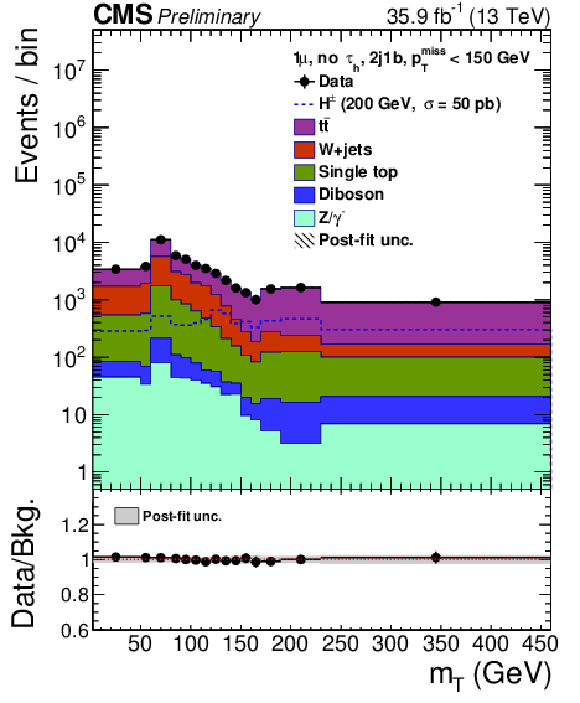
png pdf |
Figure 5-b:
The transverse mass distribution for ${\ell} $+no-${{{\tau} _\mathrm {h}}}$ category with one muon, no identified ${{\tau} _\mathrm {h}}$, two jets (one of them identified as a b jet) and $ {{p_{\mathrm {T}}} ^\text {miss}} < $ 150 GeV. |
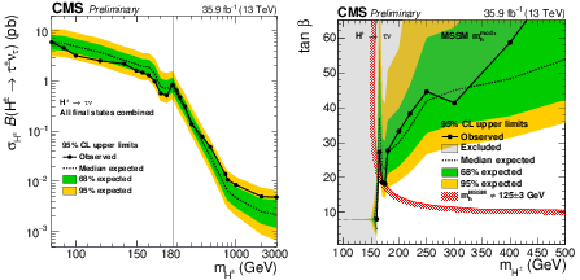
png pdf |
Figure 6:
The observed 95% CL exclusion limits on ${{\sigma _{{\mathrm {H}} ^\pm}} {\mathcal {B}({{\mathrm {H}} ^{\pm}\to {\tau}^{\pm} {\nu _{\tau}}})}}$ (solid black points), compared to the expected limit assuming only standard model processes (dashed line) for the ${\mathrm {H}^{\pm}}$ mass range from 80 to 3000 GeV (left), and the same limit interpreted in ${m_\mathrm {h}^\text {mod+}}$ benchmark scenario (right). The green (yellow) error bands represent one (two) standard deviations from the expected limit. On the left, the horizontal axis is linear from 80 to 180 GeV and logarithmic for larger ${m_{{\mathrm {H}} ^\pm}}$ values. On the right, the region below the red line is excluded assuming that the observed neutral Higgs boson is the light CP-even 2HDM Higgs boson with a mass of 125 $\pm$ 3 GeV, where the uncertainty is the theoretical uncertainty in the mass calculation. |
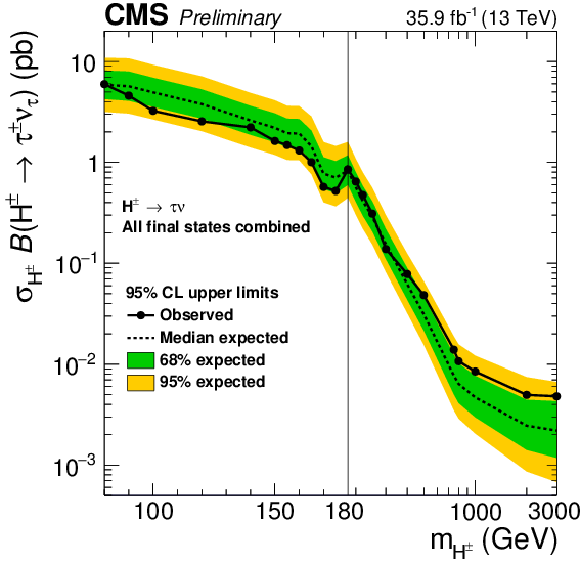
png pdf |
Figure 6-a:
The observed 95% CL exclusion limits on ${{\sigma _{{\mathrm {H}} ^\pm}} {\mathcal {B}({{\mathrm {H}} ^{\pm}\to {\tau}^{\pm} {\nu _{\tau}}})}}$ (solid black points), compared to the expected limit assuming only standard model processes (dashed line) for the ${\mathrm {H}^{\pm}}$ mass range from 80 to 3000 GeV.The green (yellow) error bands represent one (two) standard deviations from the expected limit. The horizontal axis is linear from 80 to 180 GeV and logarithmic for larger ${m_{{\mathrm {H}} ^\pm}}$ values. |
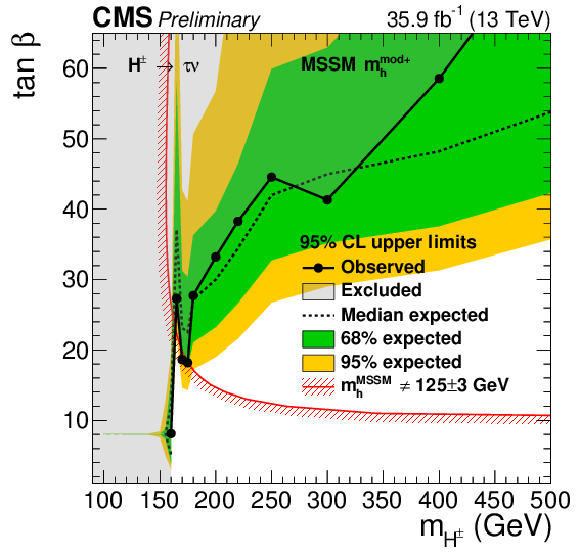
png pdf |
Figure 6-b:
The observed 95% CL exclusion limits on ${{\sigma _{{\mathrm {H}} ^\pm}} {\mathcal {B}({{\mathrm {H}} ^{\pm}\to {\tau}^{\pm} {\nu _{\tau}}})}}$ (solid black points), compared to the expected limit interpreted in the ${m_\mathrm {h}^\text {mod+}}$ benchmark scenario. The green (yellow) error bands represent one (two) standard deviations from the expected limit. The region below the red line is excluded assuming that the observed neutral Higgs boson is the light CP-even 2HDM Higgs boson with a mass of 125 $\pm$ 3 GeV, where the uncertainty is the theoretical uncertainty in the mass calculation. |
| Tables | |
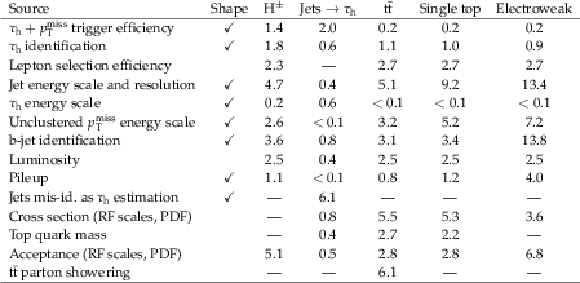
png pdf |
Table 1:
Effect of systematic uncertainties on the final event yields in %, prior to the fit, summed over all final states and categories. |

png pdf |
Table 2:
Number of expected and observed events for the three final states after all selections, summed over all categories in each final state. For background processes, the event yields after background-only fit and the corresponding uncertainties are shown. For the ${\mathrm {H}^{\pm}}$ mass hypotheses of 100, 200 and 2000 GeV, the signal yields are normalized to the ${\mathrm {H}^{\pm}}$ production cross section of 1 pb and the total systematic uncertainties (prior to the fit) are shown. |
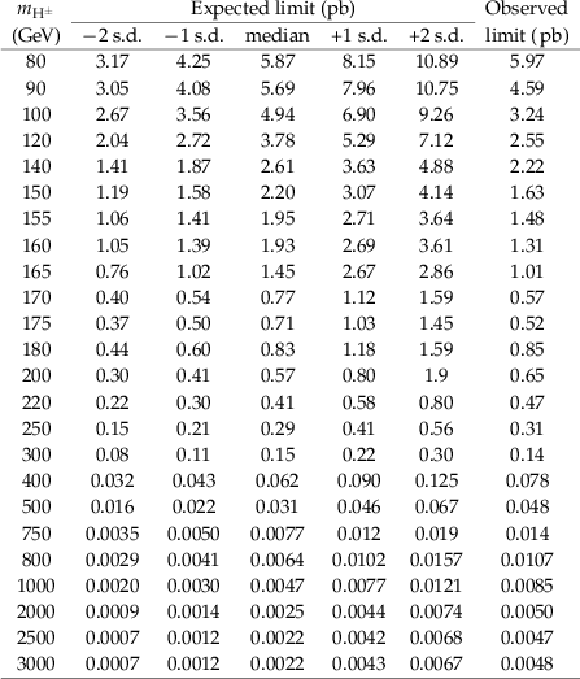
png pdf |
Table 3:
The expected and observed 95% CL exclusion limits on ${{\sigma _{{\mathrm {H}} ^\pm}} {\mathcal {B}({{\mathrm {H}} ^{\pm}\to {\tau}^{\pm} {\nu _{\tau}}})}}$ for the ${\mathrm {H}^{\pm}}$ mass range from 80 to 3000 GeV. The $ \pm $1 s.d. ($ \pm $2 s.d.) refers to one (two) standard deviations from the expected limit. |
| Summary |
| A search for charged Higgs bosons decaying as $ \mathrm{H}^{\pm} \to \tau^{\pm}\nu_\tau$ has been presented, using events recorded by the CMS experiment in 2016 at a center-of-mass energy of 13 TeV. Transverse mass distributions are reconstructed in hadronic and leptonic final states, and are found to agree with the standard model expectation. Upper limits for the ${\mathrm {H}^{\pm}}$ production cross section times the branching fraction are set at 95% confidence level for a ${\mathrm {H}^{\pm}}$ mass ranging from 80 GeV to 3 TeV, including the mass range close to the top quark mass. The observed limit ranges from 6.0 pb at 80 GeV to 0.005 pb at 3 TeV. The results are interpreted as constraints in the parameter space of the MSSM ${m_\mathrm{h}^\text{mod+}} $ benchmark scenario. In this scenario, all $ \tan \beta $ values are excluded for charged Higgs boson masses up to 150 GeV. |
| Additional Figures | |
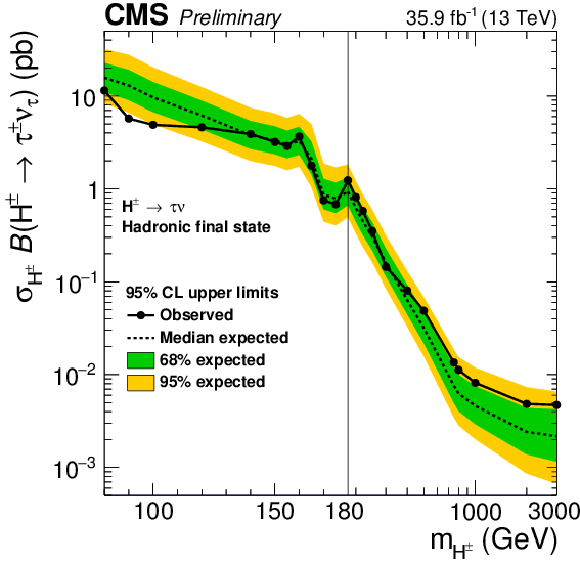
png pdf |
Additional Figure 1:
Observed 95% CL exclusion limits on ${\sigma _{{\mathrm {H}^{\pm}}} \mathcal {B}({\mathrm {H}^{\pm}} \to {\tau}^{\pm} {\nu _{\tau}})}$ (solid black points), compared to the expected limit assuming only standard model processes (dashed line) for the ${\mathrm {H}^{\pm}}$ mass range from 80 to 3000 GeV in the hadronic final state. The green (yellow) error bands represent one (two) standard deviations from the expected limit. The horizontal axis is linear from 80 to 180 GeV and logarithmic for larger $m_{{\mathrm {H}^{\pm}}}$ values. |
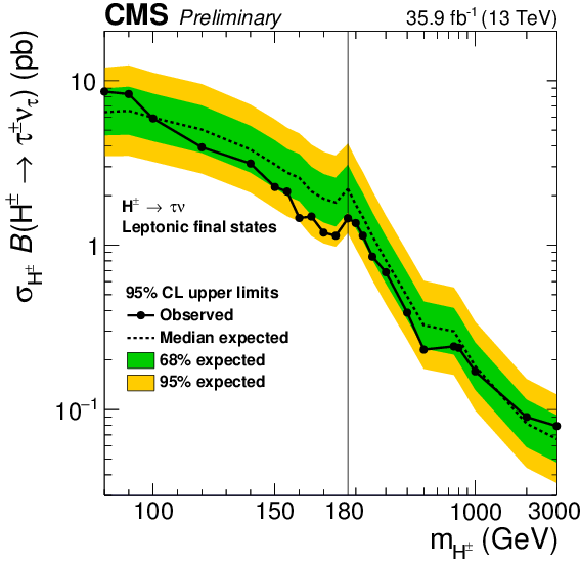
png pdf |
Additional Figure 2:
Observed 95% CL exclusion limits on ${\sigma _{{\mathrm {H}^{\pm}}} \mathcal {B}({\mathrm {H}^{\pm}} \to {\tau}^{\pm} {\nu _{\tau}})}$ (solid black points), compared to the expected limit assuming only standard model processes (dashed line) for the ${\mathrm {H}^{\pm}}$ mass range from 80 to 3000 GeV in the leptonic final states. The green (yellow) error bands represent one (two) standard deviations from the expected limit. The horizontal axis is linear from 80 to 180 GeV and logarithmic for larger $m_{{\mathrm {H}^{\pm}}}$ values. |
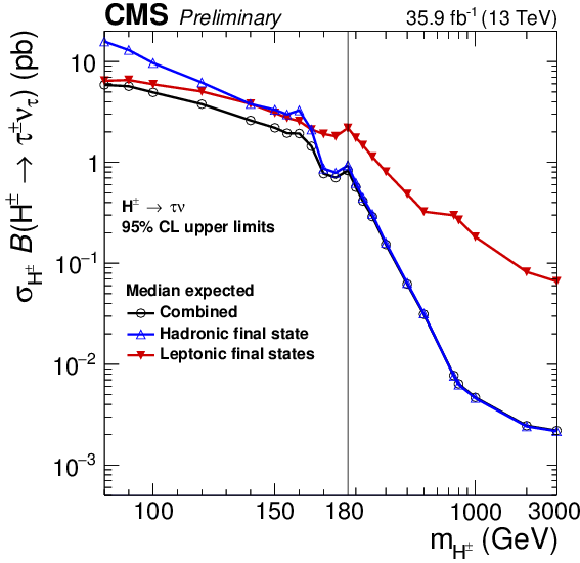
png pdf |
Additional Figure 3:
Median expected 95% CL exclusion limits on ${\sigma _{{\mathrm {H}^{\pm}}} \mathcal {B}({\mathrm {H}^{\pm}} \to {\tau}^{\pm} {\nu _{\tau}})}$ in the hadronic final state (blue), in the leptonic final states (red) and for all final states combined (black). The horizontal axis is linear from 80 to 180 GeV and logarithmic for larger $m_{{\mathrm {H}^{\pm}}}$ values. |
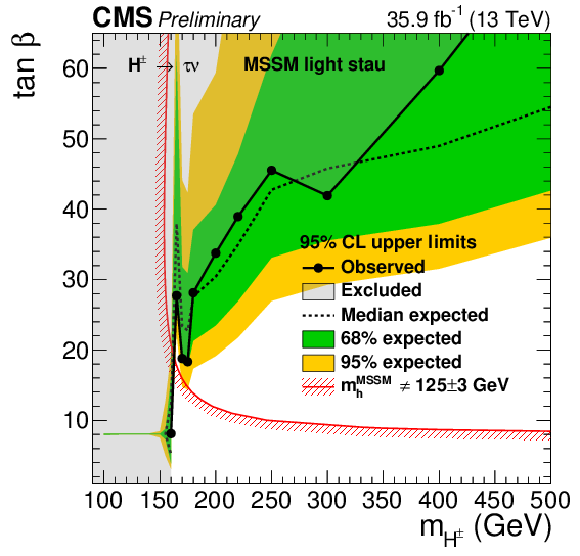
png pdf |
Additional Figure 4:
Observed limits (solid black points) interpreted as a 95% CL exclusion region (light-grey area) in the MSSM ($m_{{\mathrm {H}^{\pm}}}$, $ \tan\beta $) parameter space in the light stau benchmark scenario, compared to the expected limit assuming only standard model processes (dashed line). The green (yellow) error bands represent one (two) standard deviations from the expected limit. The region below the red line is excluded assuming that the observed neutral Higgs boson is the light CP-even 2HDM Higgs boson with a mass of 125 $\pm$ 3 GeV, where the uncertainty is the theoretical uncertainty in the mass calculation. |
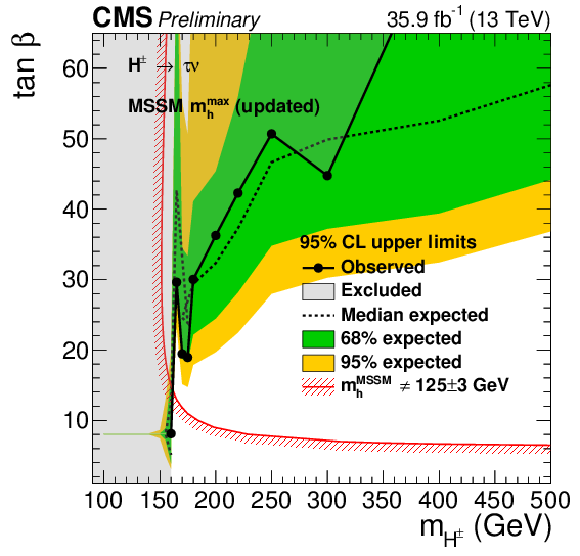
png pdf |
Additional Figure 5:
Observed limits (solid black points) interpreted as a 95% CL exclusion region (light-grey area) in the MSSM ($m_{{\mathrm {H}^{\pm}}}$, $ \tan\beta $) parameter space in the ${m_\mathrm {h}^\text {max}}$ (updated) benchmark scenario, compared to the expected limit assuming only standard model processes (dashed line). The green (yellow) error bands represent one (two) standard deviations from the expected limit. The region below the red line is excluded assuming that the observed neutral Higgs boson is the light CP-even 2HDM Higgs boson with a mass of 125 $\pm$ 3 GeV, where the uncertainty is the theoretical uncertainty in the mass calculation. |
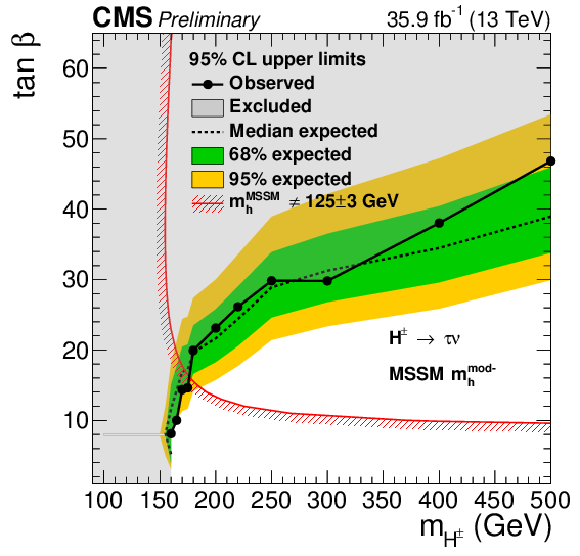
png pdf |
Additional Figure 6:
Observed limits (solid black points) interpreted as a 95% CL exclusion region (light-grey area) in the MSSM ($m_{{\mathrm {H}^{\pm}}}$, $ \tan\beta $) parameter space in the ${m_\mathrm {h}^\text {mod-}}$ benchmark scenario, compared to the expected limit assuming only standard model processes (dashed line). The green (yellow) error bands represent one (two) standard deviations from the expected limit. The region below the red line is excluded assuming that the observed neutral Higgs boson is the light CP-even 2HDM Higgs boson with a mass of 125 $\pm$ 3 GeV, where the uncertainty is the theoretical uncertainty in the mass calculation. |

png pdf |
Additional Figure 7:
Observed limits (solid black points) interpreted as a 95% CL exclusion region (light-grey area) in the MSSM ($m_{{\mathrm {H}^{\pm}}}$, $ \tan\beta $) parameter space in the $ {\tau}$-phobic benchmark scenario, compared to the expected limit assuming only standard model processes (dashed line). The green (yellow) error bands represent one (two) standard deviations from the expected limit. The region above the red line is excluded assuming that the observed neutral Higgs boson is the light CP-even 2HDM Higgs boson with a mass of 125 $\pm$ 3 GeV, where the uncertainty is the theoretical uncertainty in the mass calculation. |
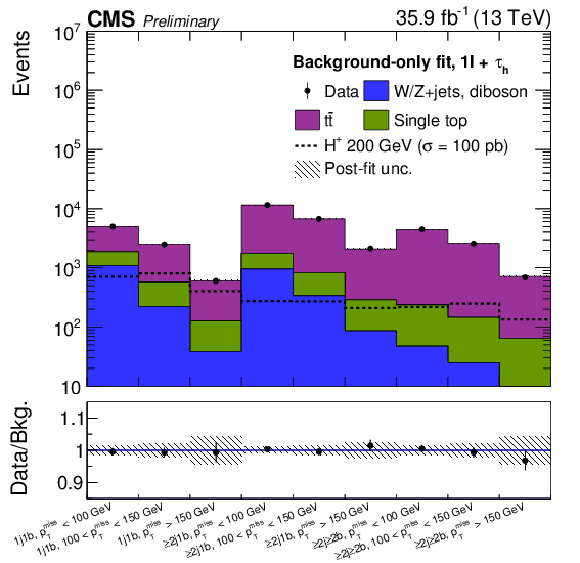
png pdf |
Additional Figure 8:
Background event yields in the ${\ell}$+${{{\tau} _\mathrm {h}}}$ final state, shown in the categories defined by jet multiplicity, the number of jets passing the b jet identification, and the value of ${{p_{\mathrm {T}}} ^\text {miss}}$, after a simultaneous background-only fit to data using the transverse mass distributions of all categories. For illustration, the expected signal for a charged Higgs boson with $m_{{\mathrm {H}^{\pm}}} = $ 200 GeV is shown, normalized to a cross section times branching fraction of 100 pb. |

png pdf |
Additional Figure 9:
Background event yields in the ${\ell}$+no-${{{\tau} _\mathrm {h}}}$ final state, shown in the categories defined by jet multiplicity, the number of jets passing the b jet identification, and the value of ${{p_{\mathrm {T}}} ^\text {miss}}$, after a simultaneous background-only fit to data using the transverse mass distributions of all categories. For illustration, the expected signal for a charged Higgs boson with $m_{{\mathrm {H}^{\pm}}} = $ 200 GeV is shown, normalized to a cross section times branching fraction of 100 pb. |
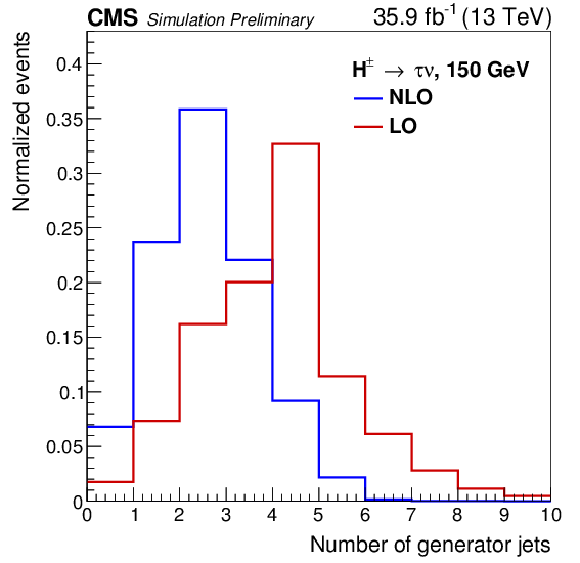
png pdf |
Additional Figure 10:
Generator level jet multiplicity distributions for next-to-leading order (NLO, blue curve) and leading order (LO, red curve) simulated samples for a charged Higgs boson with $m_{{\mathrm {H}^{\pm}}} = $ 150 GeV decaying to $ {\tau}^{\pm} {\nu _{\tau}}$ (inclusive in ${\tau}$ decay modes). The ${\mathrm {H}^{\pm}}$ production in association with a top quark is assumed and the four-flavor scheme is used in the simulation. |
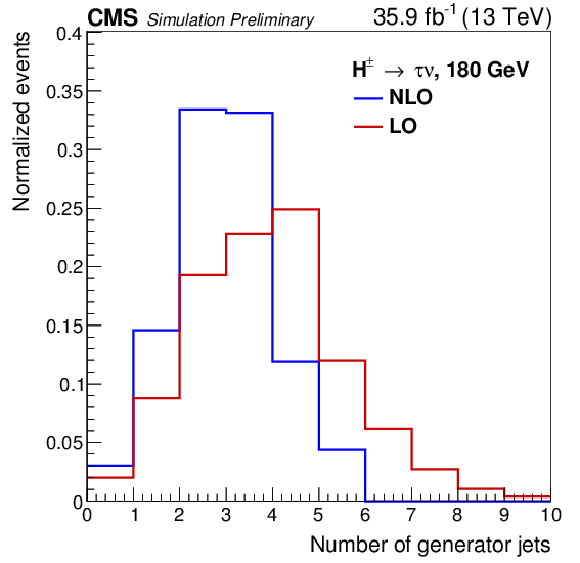
png pdf |
Additional Figure 11:
Generator level jet multiplicity distributions for next-to-leading order (NLO, blue curve) and leading order (LO, red curve) simulated samples for a charged Higgs boson with $m_{{\mathrm {H}^{\pm}}} = $ 180 GeV decaying to $ {\tau}^{\pm} {\nu _{\tau}}$ (inclusive in ${\tau}$ decay modes). The ${\mathrm {H}^{\pm}}$ production in association with a top quark is assumed and the four-flavor scheme is used in the simulation. |
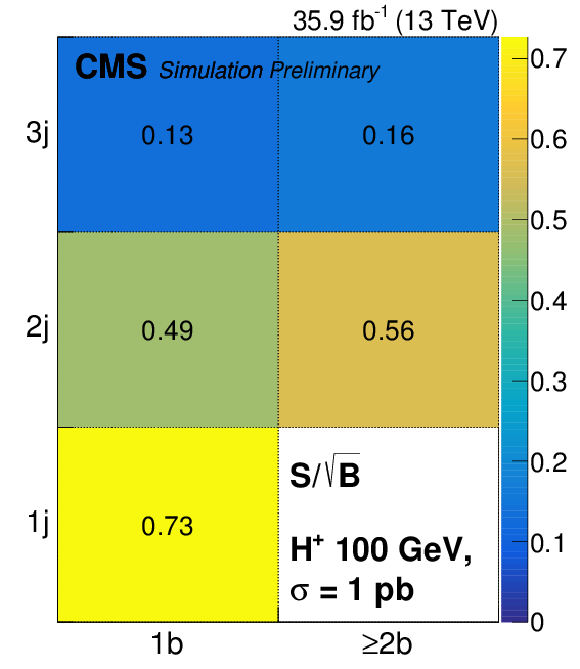
png pdf |
Additional Figure 12:
Significance $S/\sqrt {B}$ in the categories defined by jet multiplicity and the number of jets passing the b jet identification, summed over ${\ell}$+${{{\tau} _\mathrm {h}}}$ and ${\ell}$+no-${{{\tau} _\mathrm {h}}}$ final states and over electron/muon and ${{p_{\mathrm {T}}} ^\text {miss}}$ categories. $S$ represents the total signal yield for a charged Higgs boson with $m_{{\mathrm {H}^{\pm}}} = $ 100 GeV, normalized to a cross section times branching fraction of 1 pb. $B$ represents the total background yield from simulation, prior to the fit to data. |
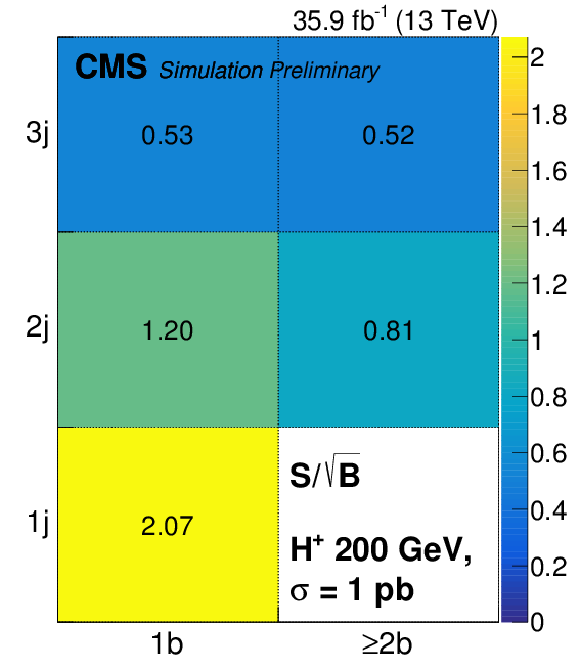
png pdf |
Additional Figure 13:
Significance $S/\sqrt {B}$ in the categories defined by jet multiplicity and the number of jets passing the b jet identification, summed over ${\ell}$+${{{\tau} _\mathrm {h}}}$ and ${\ell}$+no-${{{\tau} _\mathrm {h}}}$ final states and over electron/muon and ${{p_{\mathrm {T}}} ^\text {miss}}$ categories. $S$ represents the total signal yield for a charged Higgs boson with $m_{{\mathrm {H}^{\pm}}} = $ 200 GeV, normalized to a cross section times branching fraction of 1 pb. $B$ represents the total background yield from simulation, prior to the fit to data. |
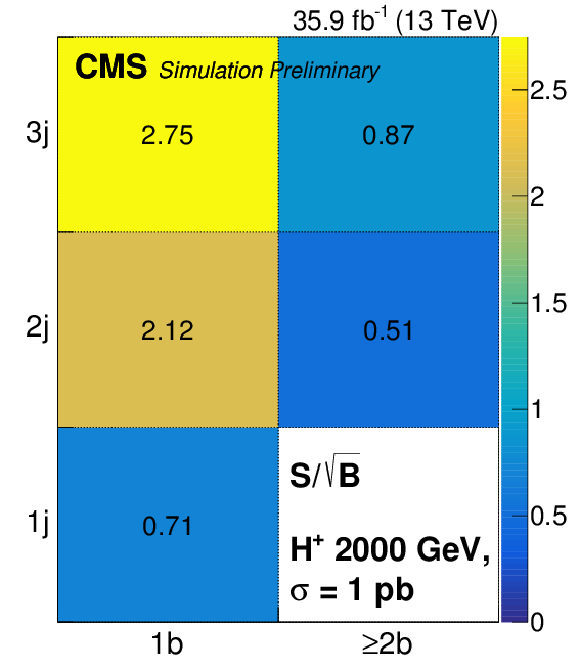
png pdf |
Additional Figure 14:
Significance $S/\sqrt {B}$ in the categories defined by jet multiplicity and the number of jets passing the b jet identification, summed over ${\ell}$+${{{\tau} _\mathrm {h}}}$ and ${\ell}$+no-${{{\tau} _\mathrm {h}}}$ final states and over electron/muon and ${{p_{\mathrm {T}}} ^\text {miss}}$ categories. $S$ represents the total signal yield for a charged Higgs boson with $m_{{\mathrm {H}^{\pm}}} = $ 2000 GeV, normalized to a cross section times branching fraction of 1 pb. $B$ represents the total background yield from simulation, prior to the fit to data. |
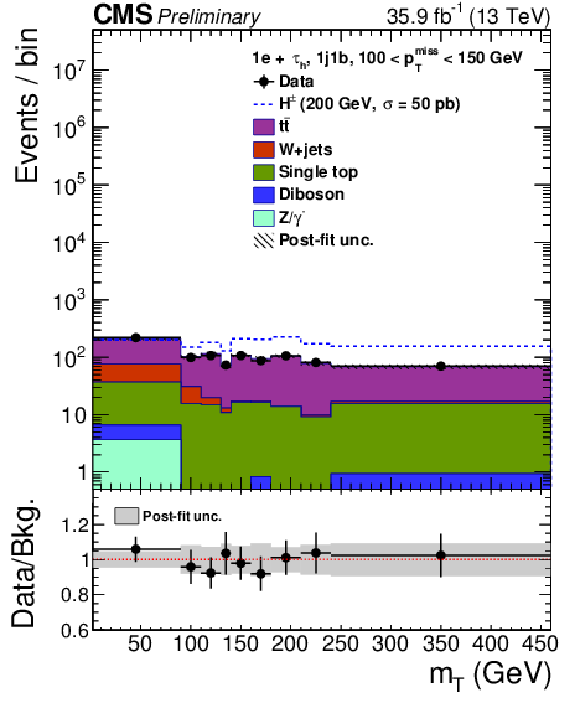
png pdf |
Additional Figure 15:
Transverse mass distribution after a background-only fit for the $\mathrm{e} $+$ {{{\tau} _\mathrm {h}}}$ final state in a category with one jet that is identified as a b jet and 100 $ < {{p_{\mathrm {T}}} ^\text {miss}} < $ 150 GeV. For illustration, the expected signal for a charged Higgs boson with $m_{{\mathrm {H}^{\pm}}} = $ 200 GeV is shown, normalized to a cross section times branching fraction of 50 pb. |

png pdf |
Additional Figure 16:
Transverse mass distribution after a background-only fit for the $\mu$+$ {{{\tau} _\mathrm {h}}}$ final state in a category with one jet that is identified as a b jet and $ {{p_{\mathrm {T}}} ^\text {miss}} > $ 150 GeV. For illustration, the expected signal for a charged Higgs boson with $m_{{\mathrm {H}^{\pm}}} = $ 200 GeV is shown, normalized to a cross section times branching fraction of 50 pb. |
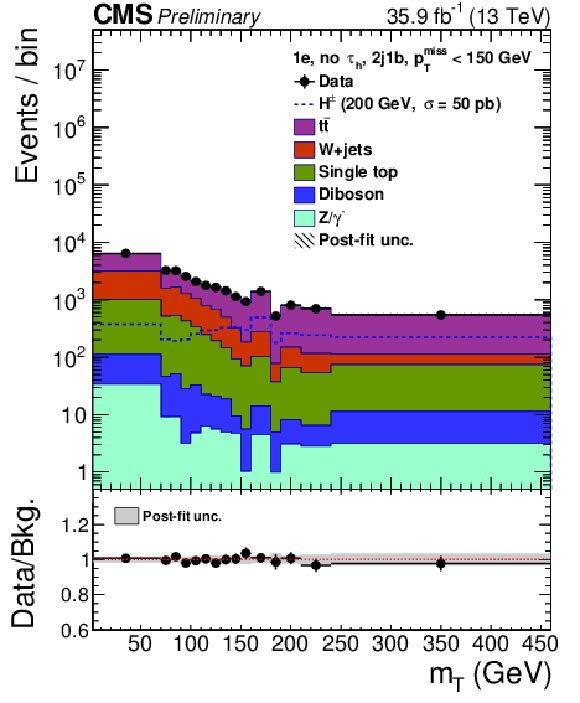
png pdf |
Additional Figure 17:
Transverse mass distribution after a background-only fit for the $\mathrm{e} $+no-$ {{{\tau} _\mathrm {h}}}$ final state in a category with two jets, one of them identified as a b jet, and $ {{p_{\mathrm {T}}} ^\text {miss}} < $ 150 GeV. For illustration, the expected signal for a charged Higgs boson with $m_{{\mathrm {H}^{\pm}}} = $ 200 GeV is shown, normalized to a cross section times branching fraction of 50 pb. |
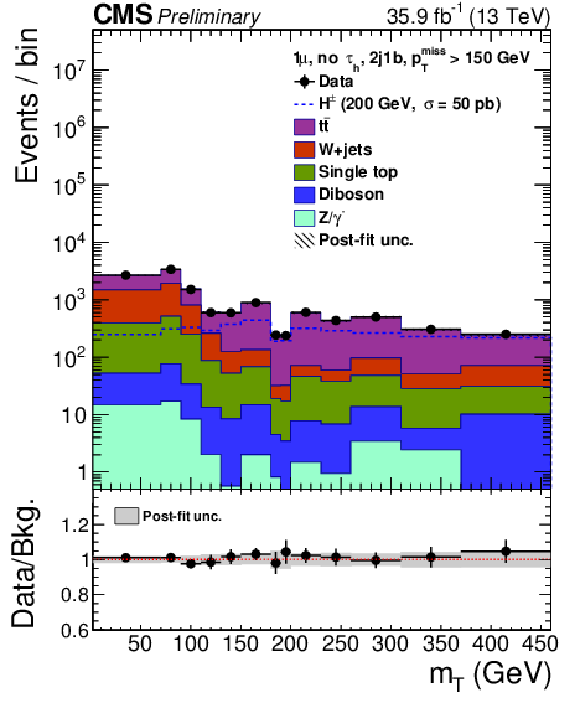
png pdf |
Additional Figure 18:
Transverse mass distribution after a background-only fit for the $\mu $+no-$ {{{\tau} _\mathrm {h}}}$ final state in a category with two jets, one of them identified as a b jet, and $ {{p_{\mathrm {T}}} ^\text {miss}} > $ 150 GeV. For illustration, the expected signal for a charged Higgs boson with $m_{{\mathrm {H}^{\pm}}} = $ 200 GeV is shown, normalized to a cross section times branching fraction of 50 pb. |
| References | ||||
| 1 | ATLAS Collaboration | Observation of a new particle in the search for the standard model Higgs boson with the ATLAS detector at the LHC | PLB 716 (2012) 1 | 1207.7214 |
| 2 | CMS Collaboration | Observation of a new boson at a mass of 125 GeV with the CMS experiment at the LHC | PLB 716 (2012) 30 | CMS-HIG-12-028 1207.7235 |
| 3 | CMS Collaboration | Observation of a new boson with mass near 125 GeV in pp collisions at $ \sqrt{s} = $ 7 and 8 TeV | JHEP 06 (2013) 081 | CMS-HIG-12-036 1303.4571 |
| 4 | P. W. Higgs | Broken symmetries, massless particles and gauge fields | PL12 (1964) 132 | |
| 5 | P. W. Higgs | Broken Symmetries and the Masses of Gauge Bosons | PRL 13 (1964) 508 | |
| 6 | G. S. Guralnik, C. R. Hagen, and T. W. B. Kibble | Global Conservation Laws and Massless Particles | PRL 13 (1964) 585 | |
| 7 | P. W. Higgs | Spontaneous Symmetry Breakdown without Massless Bosons | PR145 (1966) 1156 | |
| 8 | T. W. B. Kibble | Symmetry breaking in non-Abelian gauge theories | PR155 (1967) 1554 | |
| 9 | F. Englert and R. Brout | Broken Symmetry and the Mass of Gauge Vector Mesons | PRL 13 (1964) 321 | |
| 10 | ATLAS and CMS Collaborations | Measurements of the Higgs boson production and decay rates and constraints on its couplings from a combined ATLAS and CMS analysis of the LHC pp collision data at $ \sqrt{s}= $ 7 and 8 TeV | JHEP 08 (2016) 045 | 1606.02266 |
| 11 | ATLAS Collaboration | Study of the spin and parity of the Higgs boson in diboson decays with the ATLAS detector | EPJC 75 (2015) 476 | 1506.05669 |
| 12 | CMS Collaboration | Constraints on the spin-parity and anomalous HVV couplings of the Higgs boson in proton collisions at 7 and 8 TeV | PRD 92 (2015) 012004 | CMS-HIG-14-018 1411.3441 |
| 13 | G. C. Branco et al. | Theory and phenomenology of two-Higgs-doublet models | PR 516 (2012) 1 | 1106.0034 |
| 14 | A. Djouadi | The Anatomy of electro-weak symmetry breaking. II. The Higgs bosons in the minimal supersymmetric model | PR 459 (2008) 1 | hep-ph/0503173 |
| 15 | G. Senjanovic and R. N. Mohapatra | Exact Left-Right Symmetry and Spontaneous Violation of Parity | PRD 12 (1975) 1502 | |
| 16 | J. F. Gunion, R. Vega, and J. Wudka | Higgs triplets in the standard model | PRD 42 (1990) 1673 | |
| 17 | H. Georgi and M. Machacek | Doubly charged Higgs bosons | NPB 262 (1985) 463 | |
| 18 | C. Degrande et al. | Accurate predictions for charged Higgs production: Closing the $ m_{\mathrm{h}^{\pm}}\sim m_\mathrm{t} $ window | PLB 772 (2017) 87 | 1607.05291 |
| 19 | ALEPH, DELPHI, L3, OPAL and LEP Collaborations | Search for charged Higgs bosons: combined results using LEP data | EPJC 73 (2013) 2463 | 1301.6065 |
| 20 | CDF Collaboration | Search for Higgs bosons predicted in two-Higgs-doublet models via decays to tau lepton pairs in 1.96 TeV p anti-p collisions | PRL 103 (2009) 201801 | 0906.1014 |
| 21 | D0 Collaboration | Search for Higgs bosons of the minimal supersymmetric standard model in $ \mathrm{p\overline{p}} $ collisions at $ \sqrt{s}= $ 1.96 TeV | PLB 710 (2012) 569 | 1112.5431 |
| 22 | ATLAS Collaboration | Search for charged Higgs bosons decaying via $ \mathrm{H}^{+} \to \tau \nu $ in top quark pair events using pp collision data at $ \sqrt{s}= $ 7 TeV with the ATLAS detector | JHEP 06 (2012) 039 | 1204.2760 |
| 23 | CMS Collaboration | Search for a light charged Higgs boson in top quark decays in pp collisions at $ \sqrt{s}= $ 7 TeV | JHEP 07 (2012) 143 | CMS-HIG-11-019 1205.5736 |
| 24 | ATLAS Collaboration | Search for charged Higgs bosons through the violation of lepton universality in $ \mathrm{t\overline{t}} $ events using pp collision data at $ \sqrt{s}= $ 7 TeV with the ATLAS experiment | JHEP 03 (2013) 076 | 1212.3572 |
| 25 | ATLAS Collaboration | Search for charged Higgs bosons decaying via $ \mathrm{H}^{\pm} \rightarrow \tau^{\pm}\nu $ in fully hadronic final states using pp collision data at $ \sqrt{s} = $ 8 TeV with the ATLAS detector | JHEP 03 (2015) 088 | 1412.6663 |
| 26 | CMS Collaboration | Search for a charged Higgs boson in pp collisions at $ \sqrt{s}= $ 8 TeV | JHEP 11 (2015) 018 | CMS-HIG-14-023 1508.07774 |
| 27 | ATLAS Collaboration | Search for charged Higgs bosons produced in association with a top quark and decaying via $ \mathrm{H}^{\pm} \rightarrow \tau\nu $ using pp collision data recorded at $ \sqrt{s} = $ 13 TeV by the ATLAS detector | PLB 759 (2016) 555 | 1603.09203 |
| 28 | ATLAS Collaboration | Search for charged Higgs bosons decaying via $ \mathrm {H}^{\pm} \to \tau^{\pm}\nu_{\tau} $ in the $ \tau $+jets and $ \tau $+lepton final states with 36 fb$ ^{-1} $ of pp collision data recorded at $ \sqrt{s} = $ 13 TeV with the ATLAS experiment | Submitted to JHEP | 1807.07915 |
| 29 | ATLAS Collaboration | Search for charged Higgs bosons in the $ \mathrm{H}^{\pm} \rightarrow tb $ decay channel in pp collisions at $ \sqrt{s}= $ 8 TeV using the ATLAS detector | JHEP 03 (2016) 127 | 1512.03704 |
| 30 | ATLAS Collaboration | Search for a light charged Higgs boson in the decay channel $ \mathrm{H}^+ \to \mathrm{c}\overline{\mathrm{s}} $ in $ \mathrm{t\overline{t}} $ events using pp collisions at $ \sqrt{s} = $ 7 TeV with the ATLAS detector | EPJC73 (2013) 2465 | 1302.3694 |
| 31 | CMS Collaboration | Search for a light charged Higgs boson decaying to $ \mathrm{c}\overline{\mathrm{s}} $ in pp collisions at $ \sqrt{s}= $ 8 TeV | JHEP 12 (2015) 178 | CMS-HIG-13-035 1510.04252 |
| 32 | CMS Collaboration | Search for a charged Higgs boson decaying to charm and bottom quarks in proton-proton collisions at $ \sqrt{s} = $ 8 TeV | Submitted to JHEP | CMS-HIG-16-030 1808.06575 |
| 33 | ATLAS Collaboration | Search for a charged Higgs boson produced in the vector-boson fusion mode with decay $ \mathrm{H}^\pm \to \mathrm{W}^\pm \mathrm{Z} $ using pp collisions at $ \sqrt{s}= $ 8 TeV with the ATLAS experiment | PRL 114 (2015) 231801 | 1503.04233 |
| 34 | CMS Collaboration | Search for charged Higgs bosons produced via vector boson fusion and decaying into a pair of W and Z bosons using pp collisions at $ \sqrt{s}=13\text{}\text{}\mathrm{TeV} $ | PRL 119 (2017) 141802 | CMS-HIG-16-027 1705.02942 |
| 35 | ATLAS Collaboration | Search for additional heavy neutral Higgs and gauge bosons in the ditau final state produced in 36 fb$ ^{-1} $ of pp collisions at $ \sqrt{s}= $ 13 TeV with the ATLAS detector | JHEP 01 (2018) 055 | 1709.07242 |
| 36 | CMS Collaboration | Search for additional neutral MSSM Higgs bosons in the $ \tau\tau $ final state in proton-proton collisions at $ \sqrt{s}= $ 13 TeV | JHEP 09 (2018) 007 | CMS-HIG-17-020 1803.06553 |
| 37 | CMS Collaboration | Search for beyond the standard model Higgs bosons decaying into a $ \mathrm{b\overline{b}} $ pair in pp collisions at $ \sqrt{s} = $ 13 TeV | JHEP 08 (2018) 113 | CMS-HIG-16-018 1805.12191 |
| 38 | A. Arbey, F. Mahmoudi, O. Stal, and T. Stefaniak | Status of the charged higgs boson in two Higgs doublet models | EPJC 78 (2018) 182 | 1706.07414 |
| 39 | M. Carena et al. | MSSM Higgs boson searches at the LHC: Benchmark scenarios after the discovery of a Higgs-like particle | EPJC 73 (2013) 2552 | 1302.7033 |
| 40 | CMS Collaboration | The CMS trigger system | JINST 12 (2017) P01020 | CMS-TRG-12-001 1609.02366 |
| 41 | CMS Collaboration | The CMS experiment at the CERN LHC | JINST 3 (2008) S08004 | CMS-00-001 |
| 42 | J. Alwall et al. | The automated computation of tree-level and next-to-leading order differential cross sections, and their matching to parton shower simulations | JHEP 07 (2014) 079 | 1405.0301 |
| 43 | P. Artoisenet, R. Frederix, O. Mattelaer, and R. Rietkerk | Automatic spin-entangled decays of heavy resonances in Monte Carlo simulations | JHEP 03 (2013) 015 | 1212.3460 |
| 44 | T. Sjostrand et al. | An introduction to PYTHIA 8.2 | CPC 191 (2015) 159 | 1410.3012 |
| 45 | P. Nason | A new method for combining NLO QCD with shower Monte Carlo algorithms | JHEP 11 (2004) 040 | hep-ph/0409146 |
| 46 | S. Frixione, P. Nason, and C. Oleari | Matching NLO QCD computations with parton shower simulations: the POWHEG method | JHEP 11 (2007) 070 | 0709.2092 |
| 47 | S. Alioli, P. Nason, C. Oleari, and E. Re | A general framework for implementing NLO calculations in shower Monte Carlo programs: the POWHEG BOX | JHEP 06 (2010) 043 | 1002.2581 |
| 48 | T. Je\vzo et al. | An NLO+PS generator for $ \mathrm{t}\mathrm{\overline{t}} $ and Wt production and decay including non-resonant and interference effects | EPJC 76 (2016) 691 | 1607.04538 |
| 49 | S. Frixione, P. Nason, and G. Ridolfi | A positive-weight next-to-leading-order Monte Carlo for heavy flavour hadroproduction | JHEP 09 (2007) 126 | 0707.3088 |
| 50 | R. Frederix and S. Frixione | Merging meets matching in MC@NLO | JHEP 12 (2012) 061 | 1209.6215 |
| 51 | S. Alioli, P. Nason, C. Oleari, and E. Re | NLO single-top production matched with shower in POWHEG: s- and t-channel contributions | JHEP 09 (2009) 111 | 0907.4076 |
| 52 | E. Re | Single-top Wt-channel production matched with parton showers using the POWHEG method | EPJC 71 (2011) 1547 | 1009.2450 |
| 53 | J. Alwall et al. | Comparative study of various algorithms for the merging of parton showers and matrix elements in hadronic collisions | EPJC 53 (2008) 473 | 0706.2569 |
| 54 | M. Czakon and A. Mitov | Top++: A program for the calculation of the top-pair cross-section at hadron colliders | CPC 185 (2014) 2930 | 1112.5675 |
| 55 | N. Kidonakis | Top Quark Production | in Proceedings, Helmholtz International Summer School on Physics of Heavy Quarks and Hadrons (HQ 2013), p. 139 2014 | 1311.0283 |
| 56 | P. Kant et al. | HatHor for single top-quark production: Updated predictions and uncertainty estimates for single top-quark production in hadronic collisions | CPC 191 (2015) 74 | 1406.4403 |
| 57 | K. Melnikov and F. Petriello | Electroweak gauge boson production at hadron colliders through $ o(\alpha_{s}^2) $ | PRD 74 (2006) 114017 | hep-ph/0609070 |
| 58 | J. M. Campbell, R. K. Ellis, and C. Williams | Vector boson pair production at the LHC | JHEP 07 (2011) 018 | 1105.0020 |
| 59 | NNPDF Collaboration | Unbiased global determination of parton distributions and their uncertainties at NNLO and at LO | NPB 855 (2012) 153 | 1107.2652 |
| 60 | CMS Collaboration | Event generator tunes obtained from underlying event and multiparton scattering measurements | EPJC 76 (2016) 155 | CMS-GEN-14-001 1512.00815 |
| 61 | CMS Collaboration | Investigations of the impact of the parton shower tuning in Pythia 8 in the modelling of $ \mathrm{t\overline{t}} $ at $ \sqrt{s}= $ 8 and 13 TeV | CMS-PAS-TOP-16-021 | CMS-PAS-TOP-16-021 |
| 62 | GEANT4 Collaboration | GEANT4: A simulation toolkit | NIMA 506 (2003) 250 | |
| 63 | CMS Collaboration | Particle-flow reconstruction and global event description with the CMS detector | JINST 12 (2017) P10003 | CMS-PRF-14-001 1706.04965 |
| 64 | K. Rose | Deterministic annealing for clustering, compression, classification, regression, and related optimization problems | Proceedings of the IEEE 86 (1998) 2210 | |
| 65 | M. Cacciari, G. P. Salam, and G. Soyez | The anti-$ {k_{\mathrm{T}}} $ jet clustering algorithm | JHEP 04 (2008) 063 | 0802.1189 |
| 66 | M. Cacciari, G. P. Salam, and G. Soyez | FastJet user manual | EPJC 72 (2012) 1896 | 1111.6097 |
| 67 | CMS Collaboration | Performance of electron reconstruction and selection with the CMS detector in proton-proton collisions at $ \sqrt{s} = $ 8 TeV | JINST 10 (2015) P06005 | CMS-EGM-13-001 1502.02701 |
| 68 | A. Hoecker et al. | TMVA: Toolkit for multivariate data analysis | PoS ACAT (2007) 040 | physics/0703039 |
| 69 | CMS Collaboration | Performance of the CMS muon detector and muon reconstruction with proton-proton collisions at $ \sqrt{s} = $ 13 TeV | JINST 13 (2018) P06015 | CMS-MUO-16-001 1804.04528 |
| 70 | CMS Collaboration | Jet energy scale and resolution in the CMS experiment in pp collisions at 8 TeV | JINST 12 (2017) P02014 | CMS-JME-13-004 1607.03663 |
| 71 | CMS Collaboration | Jet algorithms performance in 13 TeV data | CMS-PAS-JME-16-003 | CMS-PAS-JME-16-003 |
| 72 | CMS Collaboration | Identification of b-quark jets with the CMS experiment | JINST 8 (2013) P04013 | CMS-BTV-12-001 1211.4462 |
| 73 | CMS Collaboration | Identification of heavy-flavour jets with the CMS detector in pp collisions at 13 TeV | JINST 13 (2018) P05011 | CMS-BTV-16-002 1712.07158 |
| 74 | CMS Collaboration | Reconstruction and identification of $ \tau $ lepton decays to hadrons and $ \nu_\tau $ at CMS | JINST 11 (2016) P01019 | CMS-TAU-14-001 1510.07488 |
| 75 | CMS Collaboration | Performance of reconstruction and identification of $ \tau $ leptons decaying to hadrons and $ \nu_\tau $ in pp collisions at $ \sqrt{s}= $ 13 TeV | Accepted by JINST | CMS-TAU-16-003 1809.02816 |
| 76 | CMS Collaboration | Performance of missing transverse momentum in pp collisions at $ \sqrt{s} = $ 13 TeV using the CMS detector | CMS-PAS-JME-17-001 | CMS-PAS-JME-17-001 |
| 77 | D. P. Roy | The hadronic tau decay signature of a heavy charged Higgs boson at LHC | PLB 459 (1999) 607 | hep-ph/9905542 |
| 78 | ATLAS Collaboration | Measurement of the inelastic proton-proton cross section at $ \sqrt{s} = $ 13 TeV with the ATLAS detector at the LHC | PRL 117 (2016) 182002 | 1606.02625 |
| 79 | CMS Collaboration | CMS luminosity measurements for the 2016 data taking period | CMS-PAS-LUM-17-001 | CMS-PAS-LUM-17-001 |
| 80 | J. Butterworth et al. | PDF4LHC recommendations for LHC Run II | JPG 43 (2016) 023001 | 1510.03865 |
| 81 | P. Skands, S. Carrazza, and J. Rojo | Tuning PYTHIA 8.1: the Monash 2013 tune | EPJC74 (2014) 3024 | 1404.5630 |
| 82 | R. J. Barlow and C. Beeston | Fitting using finite Monte Carlo samples | CPC 77 (1993) 219 | |
| 83 | T. Junk | Confidence level computation for combining searches with small statistics | NIMA 434 (1999) 435 | hep-ex/9902006 |
| 84 | A. L. Read | Presentation of search results: The CL$ _{\text{s}} $ technique | JPG 28 (2002) 2693 | |
| 85 | The ATLAS Collaboration, The CMS Collaboration, The LHC Higgs Combination Group | Procedure for the LHC Higgs boson search combination in Summer 2011 | CMS-NOTE-2011-005 | |
| 86 | G. Cowan, K. Cranmer, E. Gross, and O. Vitells | Asymptotic formulae for likelihood-based tests of new physics | EPJC 71 (2011) 1554 | 1007.1727 |
| 87 | LHC Higgs Cross Section Working Group Collaboration | Handbook of LHC Higgs cross sections: 4. deciphering the nature of the Higgs sector | 1610.07922 | |
| 88 | M. Flechl et al. | Improved cross-section predictions for heavy charged Higgs boson production at the LHC | PRD 91 (2015) 075015 | 1409.5615 |
| 89 | C. Degrande, M. Ubiali, M. Wiesemann, and M. Zaro | Heavy charged Higgs boson production at the LHC | JHEP 10 (2015) 145 | 1507.02549 |
| 90 | S. Dittmaier, M. Kramer, M. Spira, and M. Walser | Charged-Higgs-boson production at the LHC: NLO supersymmetric QCD corrections | PRD 83 (2011) 055005 | 0906.2648 |
| 91 | E. L. Berger, T. Han, J. Jiang, and T. Plehn | Associated production of a top quark and a charged Higgs boson | PRD 71 (2005) 115012 | hep-ph/0312286 |

|
Compact Muon Solenoid LHC, CERN |
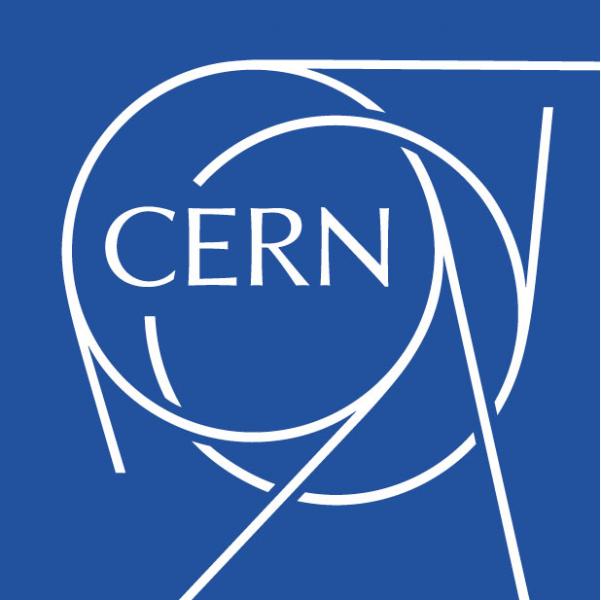
|
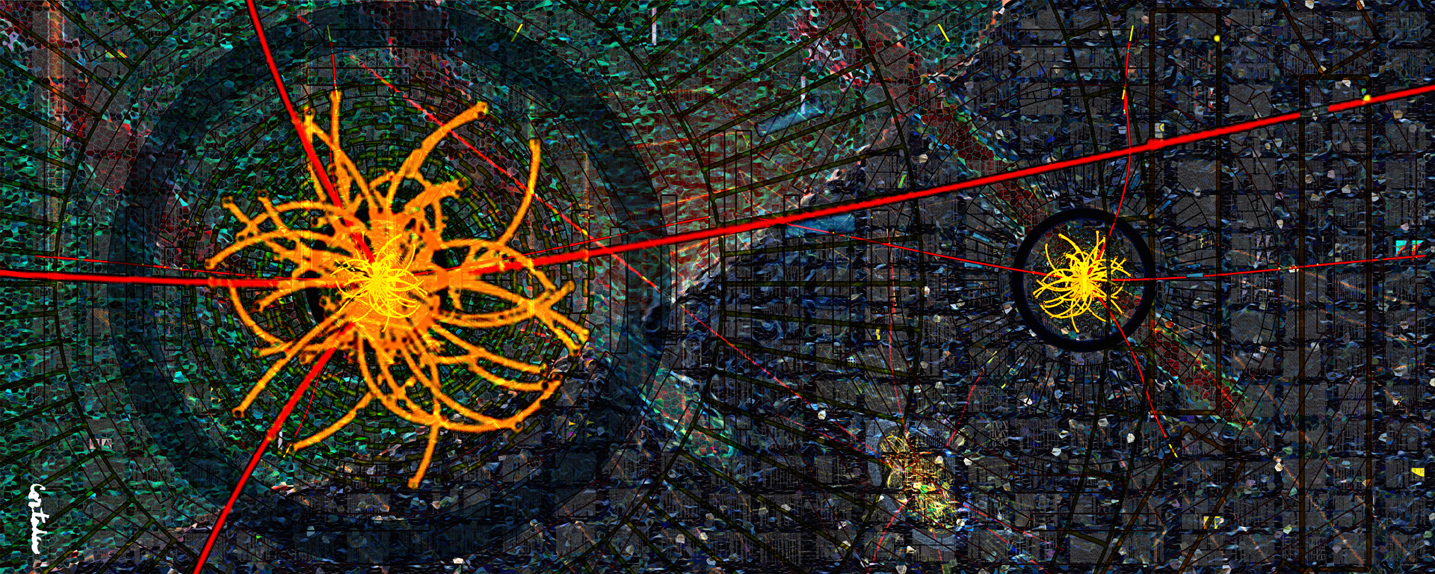
|
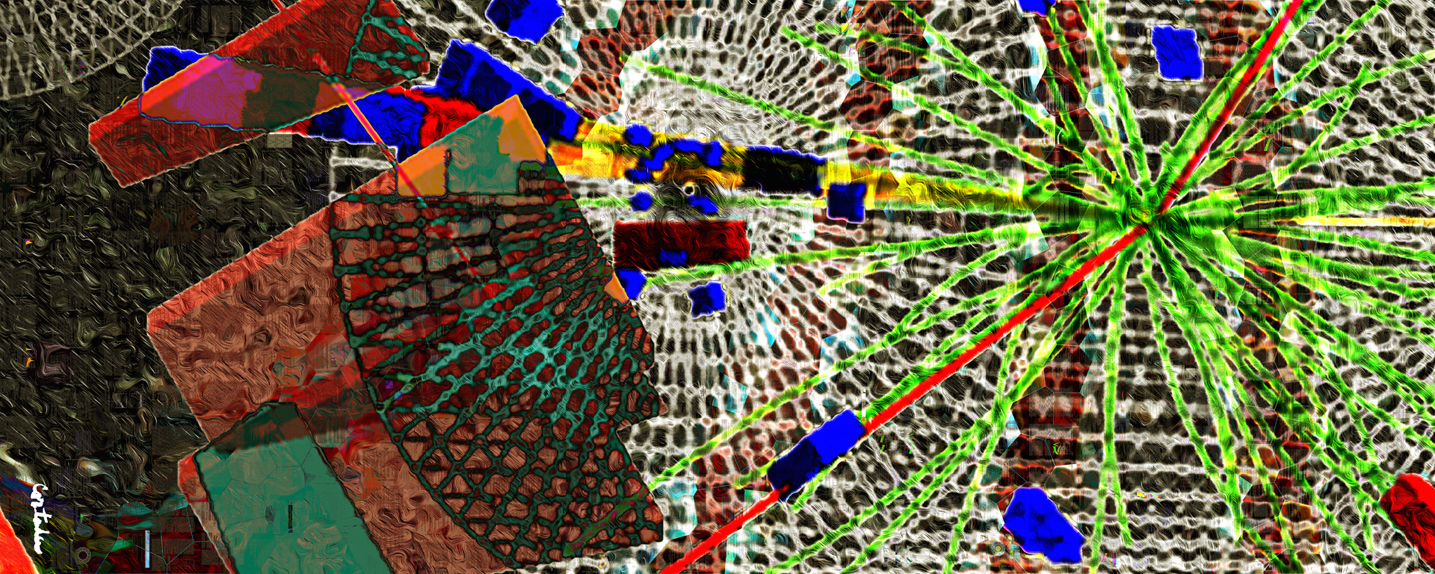
|
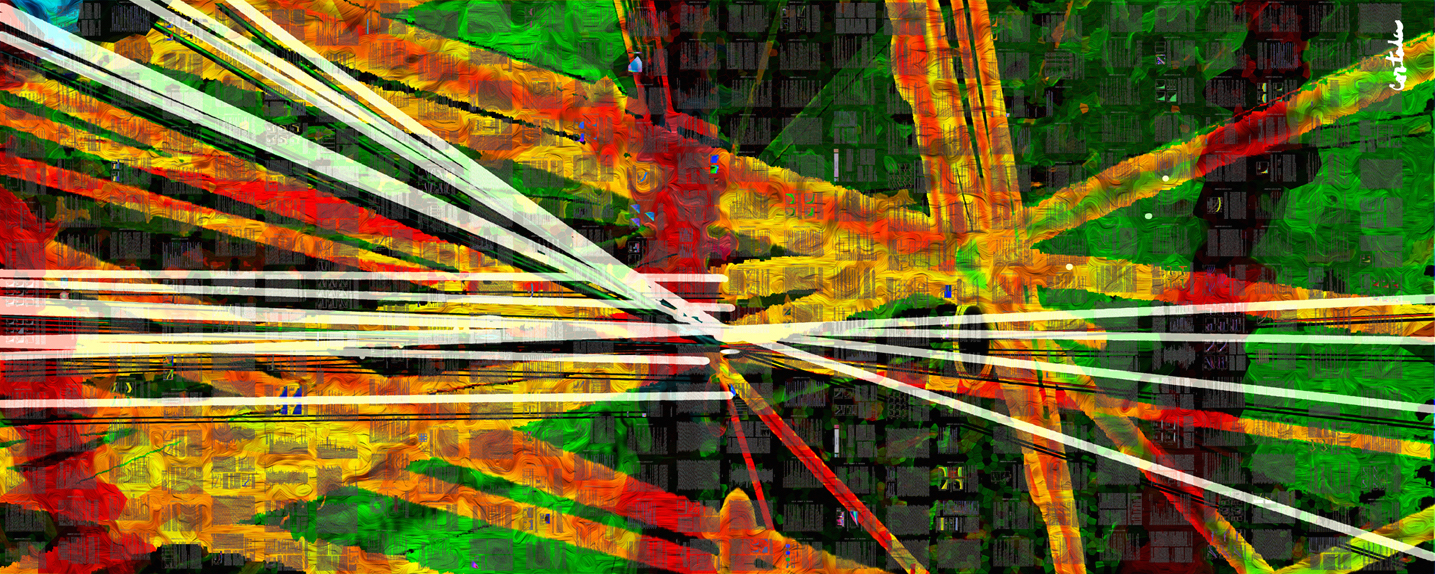
|
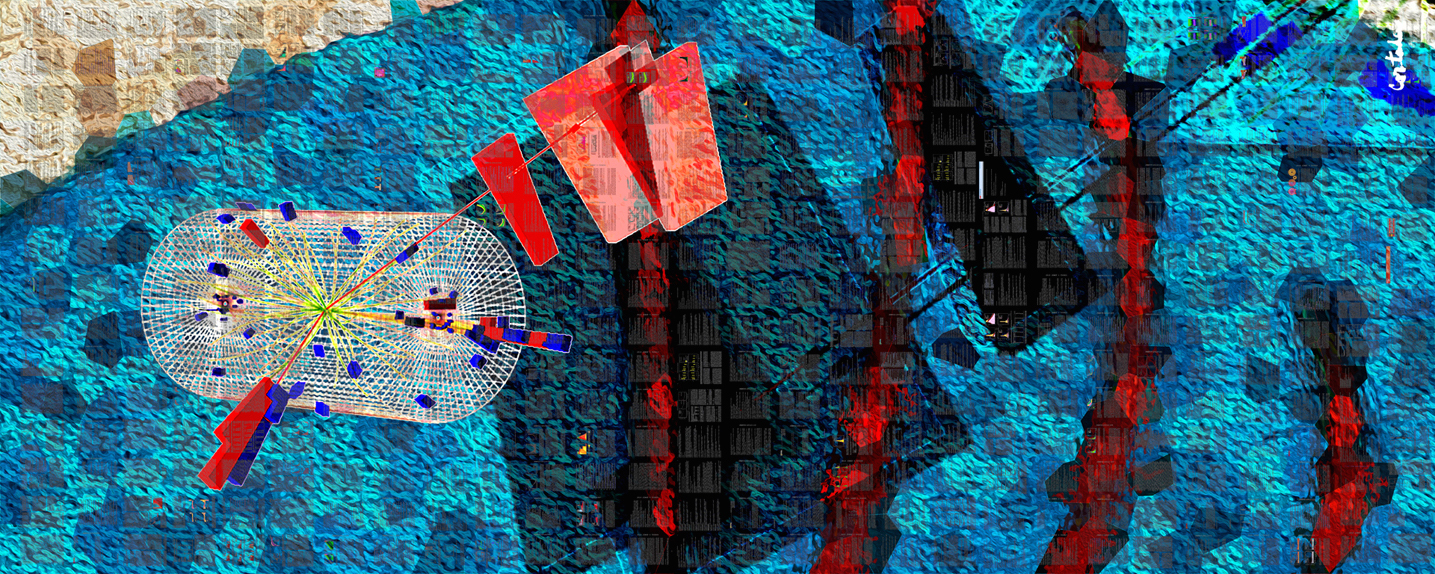
|
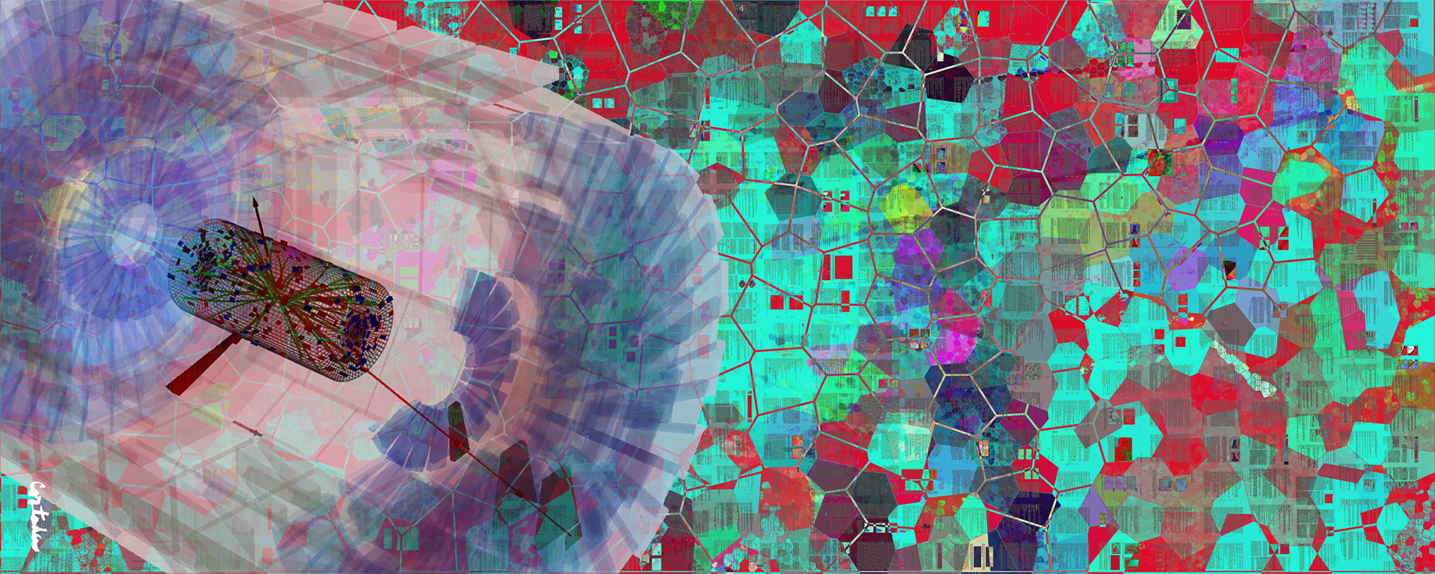
|